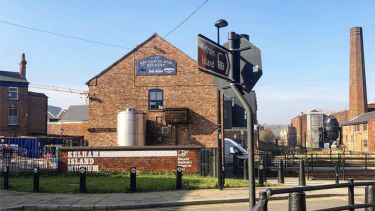An event exploring what roles artists and creatives play in the kind of urban regeneration seen in hipster neighbourhoods such as Brooklyn in New York and Kelham Island in Sheffield is being launched by arts and humanities researchers at the University of Sheffield.
The symposium, 'From Brooklyn Works to Brooklynism', is inviting artists, creatives, academics and members of the public to a day of provocation, debate and discussion to address, explore, challenge, contextualise and offer perspective on 'Brooklynism' and the Kelham Island experience.
Kelham Island was once the beating heart of industry and is one of Sheffield’s oldest manufacturing sites. However, as the face of industry and manufacturing changed in Sheffield and other northern towns and cities in the UK throughout the 19th and 20th centuries, many of the area’s steelworks, factories and workshops closed and fell into disrepair.
The Kelham Island quarter has since been transformed into one of the most desirable neighbourhoods in the country – with it recently being named as the Best Neighbourhood in the UK and Ireland at the 2019 Urbanism Awards.
According to Sheffield mythology, Brooklyn Works in Kelham Island is the place where steel was manufactured to build the Brooklyn Bridge in New York.
Now researchers from the University’s Faculty of Arts and Humanities are collaborating with the Kelham Island Museum for a day of talks and activities to explore what roles artists and creatives play in urban regeneration, gentrification and the rise of the hipster cultures seen in neighbourhoods such as Kelham Island and Brooklyn.
Dr Amanda Crawley Jackson, Director of Impact and Engagement in the University’s Faculty of Arts and Humanities, said: “Kelham Island has undergone a huge transformation in recent years, much like Brooklyn in New York City and many other neighbourhoods in the UK, US and around the world that have experienced gentrification and a rise in artisanal economies and hipster culture. However, what we must not forget is that there are winners and losers in this kind of urban regeneration, and this is what we’re hoping to focus on at the symposium.
“We hope that artists, creatives, members of the academic community and, importantly, members of the public can join us to explore and provide a new perspective on urban regeneration and urban identities.”
Professor Susan Fitzmaurice, Vice-President for Arts and Humanities at the University of Sheffield, added: “Sheffield is a distinctive city, rich in heritage, culture and creativity, infused with a spirit of independence and entrepreneurship. Now, as development begins to transform the city of Sheffield, questions are being raised about whether it is the right kind of development.
“Are we pricing communities out of their neighbourhoods? Are we ignoring the very things that make neighbourhoods great to live and work in? I believe the symposium will generate fresh perspectives on these matters as artists, place-makers, community activists, geographers, archaeologists and academics come together to share their views and debate the issues in a series of panel discussions. The day promises to be provocative. It will also be a celebration of all the individual and community endeavour going on in this city on the move.”
The symposium and collaboration forms part of the University of Sheffield’s Faculty of Arts and Humanities’ wider Knowledge Exchange project, Co-Constructive Humanities, which aims to bring the arts and humanities’ unique perspective to dialogues and debates on the cities in which we live.
From Brooklyn Works to Brooklynism is being held on Thursday 11 July 2019 from 10am until 5pm at the Kelham Island Museum


